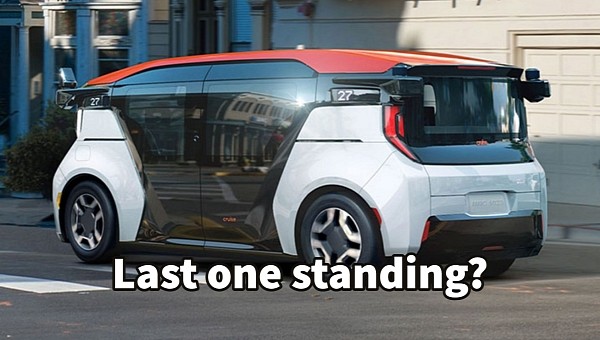With several autonomous-driving and robotaxi startups biting the dust, GM's Cruise has started dreaming about being the last one standing. The robotaxi company is pushing legislation to speed the deployment of self-driving vehicles on U.S. roads as it prepares to launch the Origin, its autonomous-driving pod.
GM's Mary Barra might be known for leaving Elon Musk in the dust when it comes to overpromising and underdelivering. Barra has been very bullish about her company's prospects of surpassing Tesla in the number of EVs sold and sure dreams of doing the same in autonomous driving. While GM's EV production is disappointing, its autonomous-driving efforts are nothing to scoff at. GM owns Cruise, the most successful robotaxi company, and is preparing to launch self-driving tech on its vehicles with Ultra Cruise.
Unlike other autonomous driving startups that had to close and lay off workers, Cruise appears to be doing alright, although it is burning cash at a high rate. The company recently expanded operations in San Francisco and other cities and is preparing to deploy the origin pod, which doesn't even have pedals or a steering wheel. There's only one problem: U.S. legislation has not advanced that fast.
Mary Barra vowed to change that, and she met with Senate Commerce Committee Chair Maria Cantwell and Senator Gary Peters, a fellow Democrat and a Commerce Committee member. The two senators support Barra in advancing "the future of mobility, including autonomous vehicles." Gary Peters thinks this is essential to ensure that "U.S. manufacturers can compete with countries like China, create jobs here, and improve roadway safety."
The Congress has delayed legislation to ease the regulation of autonomous vehicles for more than six years. In 2017, the House of Representatives passed a bill to speed up the adoption of self-driving cars. Unfortunately, the bill never passed the U.S. Senate.
GM and its self-driving subsidiary Cruise have petitioned NHTSA for permission to deploy self-driving vehicles without a steering wheel or pedals. Cruise is preparing to launch commercial services using the Origin, its self-driving pod, and wants to deploy as many as 2,500 units per year. Origin has been spotted in testing, although the prototype still featured driver controls. According to Reuters, the NHTSA opened the petition for public comment in July last year, but has not acted on it.
If GM's Barra convinces the Senate to adopt autonomous-vehicle legislation, the main beneficiary would likely be Tesla. The EV maker has promised a robotaxi for years, although it has not yet started developing such a driverless vehicle. Instead, Tesla has advanced its Self-Driving Beta software as a Level 2 driver assist technology.
Like other robotaxi companies, Cruise is also bleeding money, and it needs to cut costs to stay afloat. The company burnt nearly $2 billion in 2022, and there's no estimate yet for 2023. Robotaxi and autonomous-vehicle companies have struggled in the past year, and Ford and Volkswagen have decided to close Argo AI. Google's Waymo has also laid off over 8% of its workforce, sparking investor concerns. This means there'll be less money invested in autonomous-driving technologies in the future.
Unlike other autonomous driving startups that had to close and lay off workers, Cruise appears to be doing alright, although it is burning cash at a high rate. The company recently expanded operations in San Francisco and other cities and is preparing to deploy the origin pod, which doesn't even have pedals or a steering wheel. There's only one problem: U.S. legislation has not advanced that fast.
Mary Barra vowed to change that, and she met with Senate Commerce Committee Chair Maria Cantwell and Senator Gary Peters, a fellow Democrat and a Commerce Committee member. The two senators support Barra in advancing "the future of mobility, including autonomous vehicles." Gary Peters thinks this is essential to ensure that "U.S. manufacturers can compete with countries like China, create jobs here, and improve roadway safety."
The Congress has delayed legislation to ease the regulation of autonomous vehicles for more than six years. In 2017, the House of Representatives passed a bill to speed up the adoption of self-driving cars. Unfortunately, the bill never passed the U.S. Senate.
GM and its self-driving subsidiary Cruise have petitioned NHTSA for permission to deploy self-driving vehicles without a steering wheel or pedals. Cruise is preparing to launch commercial services using the Origin, its self-driving pod, and wants to deploy as many as 2,500 units per year. Origin has been spotted in testing, although the prototype still featured driver controls. According to Reuters, the NHTSA opened the petition for public comment in July last year, but has not acted on it.
If GM's Barra convinces the Senate to adopt autonomous-vehicle legislation, the main beneficiary would likely be Tesla. The EV maker has promised a robotaxi for years, although it has not yet started developing such a driverless vehicle. Instead, Tesla has advanced its Self-Driving Beta software as a Level 2 driver assist technology.
Like other robotaxi companies, Cruise is also bleeding money, and it needs to cut costs to stay afloat. The company burnt nearly $2 billion in 2022, and there's no estimate yet for 2023. Robotaxi and autonomous-vehicle companies have struggled in the past year, and Ford and Volkswagen have decided to close Argo AI. Google's Waymo has also laid off over 8% of its workforce, sparking investor concerns. This means there'll be less money invested in autonomous-driving technologies in the future.






